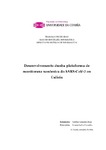Desenvolvemento dunha plataforma de monitoraxe xenómica do SARS-CoV-2 en Galicia

Use este enlace para citar
http://hdl.handle.net/2183/30958
A non ser que se indique outra cousa, a licenza do ítem descríbese como Atribución-NoComercial-SinDerivadas 3.0 España
Coleccións
Metadatos
Mostrar o rexistro completo do ítemTítulo
Desenvolvemento dunha plataforma de monitoraxe xenómica do SARS-CoV-2 en GaliciaAutor(es)
Director(es)
Ladra, SusanaData
2021Centro/Dpto/Entidade
Enxeñaría informática, Grao enDescrición
Traballo fin de grao. Enxeñaría Informática. Curso 2020/2021Resumo
[Resumo] O obxectivo deste traballo de fin de grao foi desenvolver unha aplicación que informatizase
a almacenaxe dos datos de mostras de SARS-CoV-2 tomadas en diferentes hospitais de Galicia,
así como de arquivos obtidos a partir da execución de diferentes procesos sobre estas.
Desta forma, os procesos manuais realizados ata agora, así como a elaboración de estatísticas
a partir dos datos almacenados, foron completamente informatizados, facilitando a xestión e
obtención de información útil de maneira máis rápida e eficaz. Ademais, a aplicación integrouse
coa plataforma Nextstrain, con potentes gráficos e mapas xerados a partir deses datos,
modificables en función de numerosos parámetros e variables temporais.
Para lograr este obxectivo, foi necesaria a realización dunha análise previa, co fin de entender
e definir as diferentes necesidades dos usuarios e investigadores aos que está dirixida a
aplicación. Completado o estudo preliminar, leváronse a cabo os procesos de deseño, implementación
e realización de probas sobre a operatividade da plataforma.
No desenvolvemento da aplicación empregouse, para o almacenamento da información, o sistema
de xestión de bases de datos relacionais PostgreSQL. Tamén se implementou un servidor
REST, empregando as tecnoloxías Java, Hibernate e Spring Boot, encargado de aloxar a lóxica
da aplicación, a través da implementación dos métodos necesarios para acceder e xestionar a
información almacenada na base de datos. O servidor presenta unha API REST, consumible
dende un cliente web, implementado a través de Vue.js, que proporciona unha interface responsiva
e intuitiva aos diferentes usuarios que interactúan coa aplicación.
O traballo de fin de grao foi desenvolvido seguindo unha variante da metodoloxía Scrum baseada
en iteracións, que proporcionou un produto software funcional ao final de cada fase e
permitiu a realización dun seguimento máis eficiente e eficaz. [Abstract] The aim of this final degree project has been to develop an application that computerises
the storage of data from SARS-CoV-2 samples taken in different hospitals in Galicia, and from
files obtained from the execution of different processes on these samples. In this way, the
processes carried out manually until now, as well as the elaboration of statistics from the
stored data, were completely computerised, facilitating the management and procurement of
useful information in a faster and more efficient way. In addition, the application was integrated
with the Nextstrain platform, with powerful graphs and maps generated from this
data, which can be modified according to numerous parameters and time variables.
To achieve this objective, it was necessary to carry out a preliminary analysis in order to understand
and define the different needs of the users and researchers at whom the application
is aimed. Once the preliminary study was completed, the processes of design, implementation
and testing of the platform’s operability were carried out.
In the development of the application, the PostgreSQL relational database management system
was used to store the information. A REST server was also implemented, using Java,
Hibernate and Spring Boot technologies, in charge of hosting the application logic, through
the implementation of the necessary methods to access and manage the information stored
in the database. The server presents a REST API, consumable from a web client, implemented
through Vue.js, which provides a responsive and intuitive interface to the different users that
interact with the application.
The final degree project was developed following a variant of the Scrum methodology based
on iterations, which provided a functional software product at the end of each phase and
allowed for more efficient and effective monitoring.
Palabras chave
Mostras de SARS-CoV-2
Ficheiros de procesos
Estatísticas
Nextstrain
PostgreSQL
Servidor REST
Spring
Hibernate
Vue.js
Ficheiros de procesos
Estatísticas
Nextstrain
PostgreSQL
Servidor REST
Spring
Hibernate
Vue.js
Dereitos
Atribución-NoComercial-SinDerivadas 3.0 España






